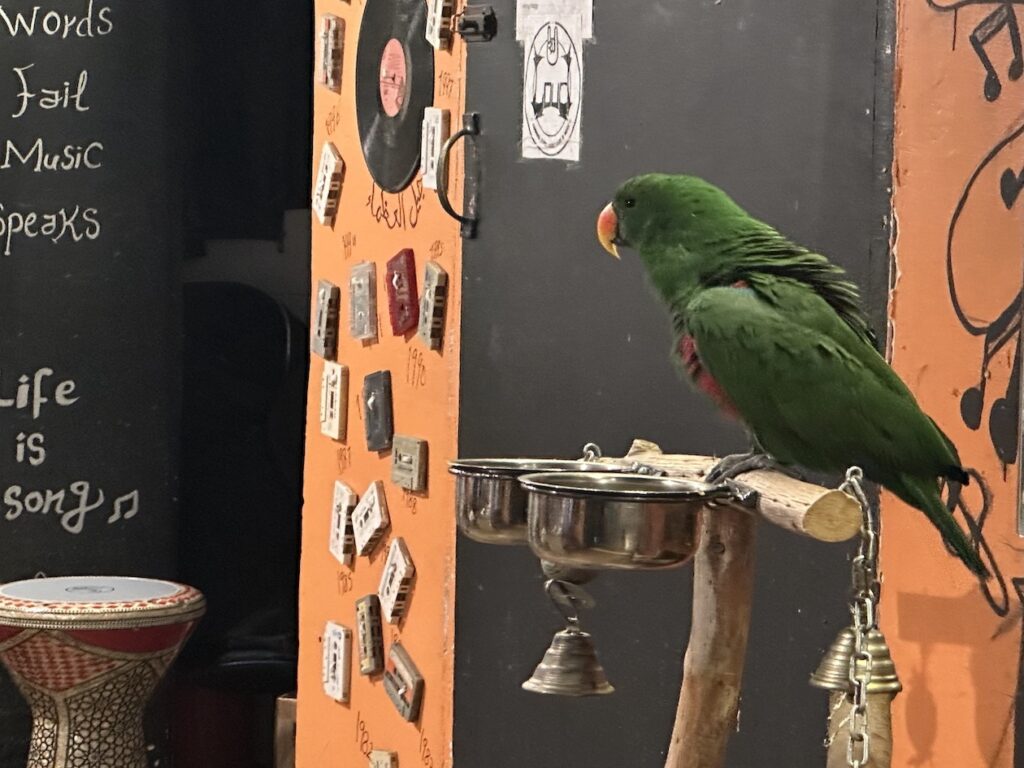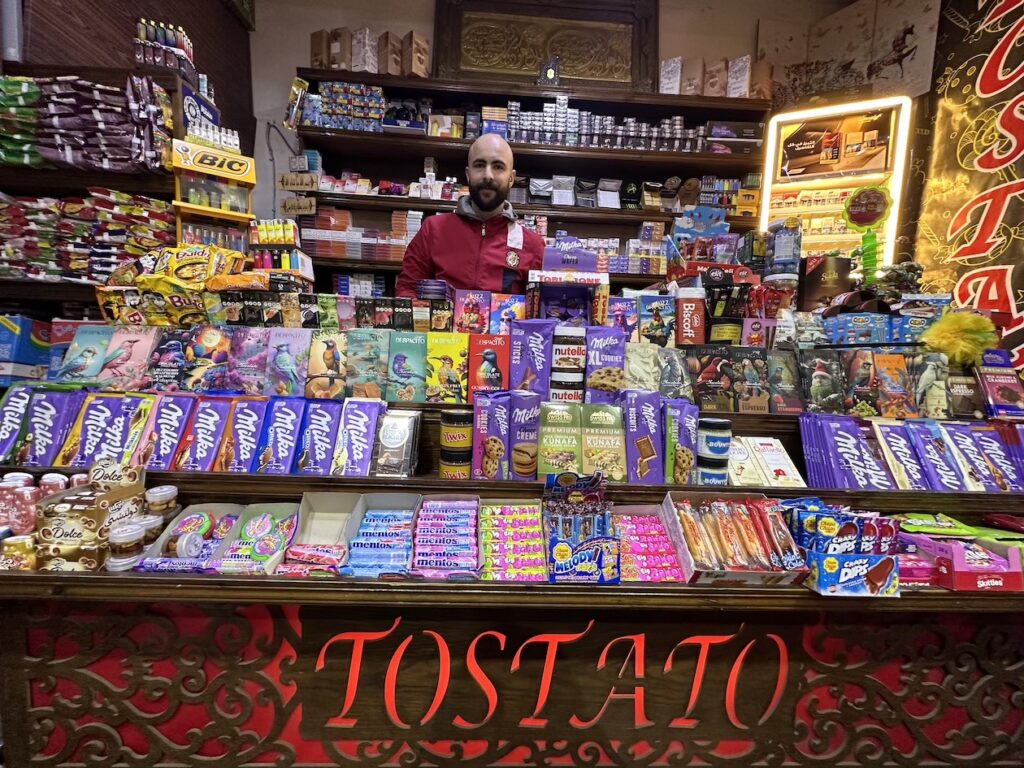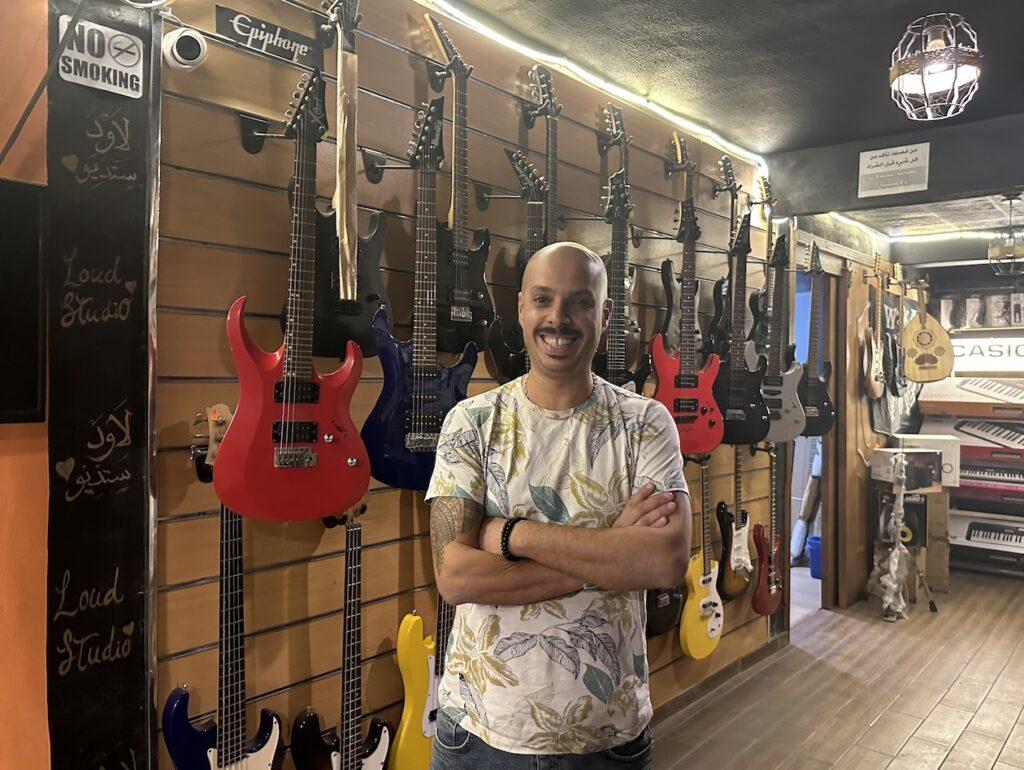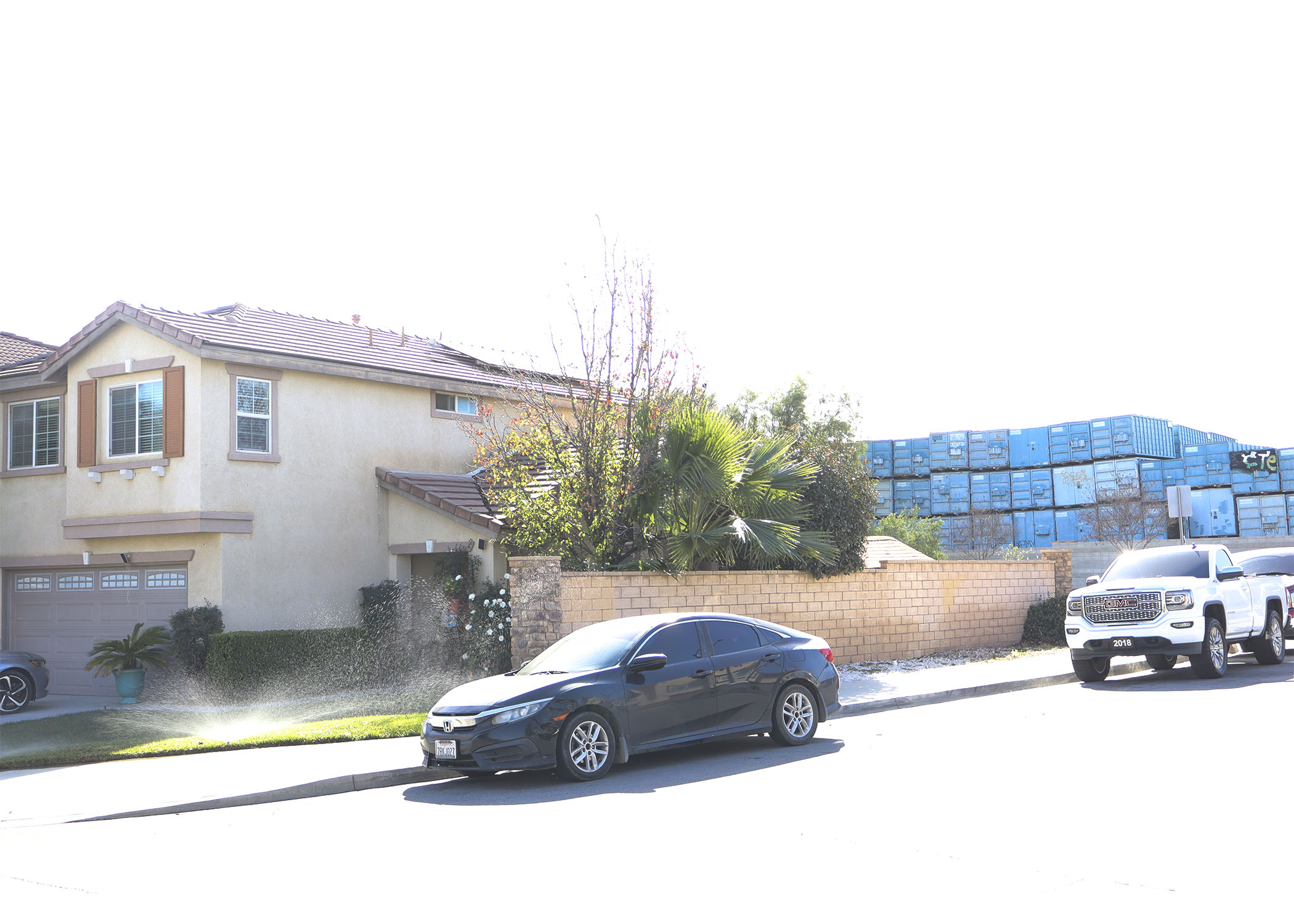(ALEXANDRIA, Egypt) — Nestled in a quiet neighborhood in Alexandria is a small music shop. Painted white and surrounded by white apartment buildings, LOUD Studio & Store blends in so that a passerby might easily miss it.
The shop sits atop a staircase marked by a silver statue of the goddess Isis seated and spreading her wings. Inside it is packed with rows of bass, electric and acoustic guitars.
Owner Hany Nagy, 44, dresses casually, wearing his usual uniform of a colorful, printed t-shirt and blue jeans.
Moving quickly around the around the shop he might be fixing a broken guitar string, looking through the equipment making sure everything is in top shape, or opening boxes of instruments and putting them out for display.
In the store you’ll also meet Nagy’s “best friend” Bayoumy, a chatty Eclectus bird, greeting visitors with his favorite phrase, “Peek-a-boo!”
But all is not as happy as it seems.
Like business owners all over the world, Nagy and his fellow shop owners in Alexandria have been struggling with inflation where annual, urban headline inflation peaked at 26.2% in August.
Egypt experienced a little relief with the Central Bank of Egypt reporting that inflation “remained broadly stable for the third consecutive month at 26.5 percent in October 2024.”
Despite Nagy’s hard work, staying afloat has been a challenge between inflation and the weak Egyptian pound relative to the US dollar.

Hany Naga outside his store [Credit : Farah Khaled]
Fewer customers have been a problem, and equipment is more expensive due to inflation.
“It’s become more expensive, maybe even triple the price we worked with from the year before this one, maybe 2022,” Nagy said, explaining that a beginner classic guitar that sold for 700 EGP, or about $14, now sells for 3,000 EGP, about $58.
Sustaining his shop has been difficult. To supplement his income through the downturn, Nagy has started delivering instruments to people’s houses and teaching customers who want to learn how to play their instruments.
“ I think that it’s personal perseverance,” Nagy said. “I can do more than one thing at the same time. So maybe that was the thing that helped me get on my feet, like fixing some musical instruments or teaching musical lessons to people, which is another part of the revenue.”
Although Nagy sources much of his inventory locally, which has helped keep down costs, other store owners rely heavily on imported goods.

Bayoumy greets customers at LOUD Studio [Credit : Farah Khaled]
“I try to set a certain standard of luxury in my store,” he said when asked about the price range of his chocolates and biscuits.
Assad imports many of his products like chocolate spreads or Milka biscuits. “ I try to get a certain amount of imported goods from abroad. I try to be different [from everyone else]. No one in the entire area has the same things as me.”
But like most small shops, Tostato has struggled with inflation. “There was a time from two years ago when the dollar reached around 70 EGP,” Assad said. “If there was a huge gap in the prices, there were things that I would sell [goods] that were 25 EGP, and now I’d sell them for 60 EGP or 70 EGP meaning double the price, and there are things that are more than double.”
“Some goods were working really well before the inflation, however after the big increase … the goods weren’t selling as well as they previously did,” he explained. “For example, Swiss Fru, Rittersport, before inflation, I used to sell it for 35 EGP, and now with the inflation it’s 95EGP,” Assad says. “Now [before] I used to get a huge amount of that goods, but with the increase, I would … get the most minimal of it, it affected the selling point.”
Like Nagy, Assad has found different ways to keep earning income like opening a cafe he runs after his night shift in the shop.

Assad Magdey Assad, in his store Tostato. [Credit : Farah Khaled]
Big Trends Affect Small Businesses
Ahmed Seif, an Egyptian journalist explains what is happening to shop owners like Hany and Assad at the macro level, and what they might face with the tariffs US President Donald Trump has promised to apply. “Globally, increased tariffs could slow trade and create market volatility. For Egypt, the impact might lean negative, as high tariffs could raise the cost of imported goods, exacerbating inflation and putting additional strain on an already vulnerable economy.”
“Egypt is particularly susceptible due to its reliance on imports and the depreciation of its currency,” Seif explained. “High inflation and external debt levels make the country more sensitive to U.S trade policies. Economic forecasts suggest significant challenges unless mitigated by international support and effective domestic strategies.” he added.
Neither Assad nor Nagy knows what the future holds as shop owners.
“I don’t know anything about the future, this job — especially the fact I sell instruments and stuff — it’s not really understood even though I’ve been here for 18, 20 years in the Egyptian market,” Nagy said. “[Sometimes] it’s in the middle of exams, and people come by and they want to play music, and sometimes we can have a time like summer vacation, and people don’t come.”
“I can’t know what the future holds. To me it’s something mysterious. I leave every day as it is.”
Assad shares similar thoughts about the future. “More than anything it’s important that you work hard, when praying to god, I hope that God blesses me, with the amount of work I’ve done and [At the end of the day]it really is up to God.”


